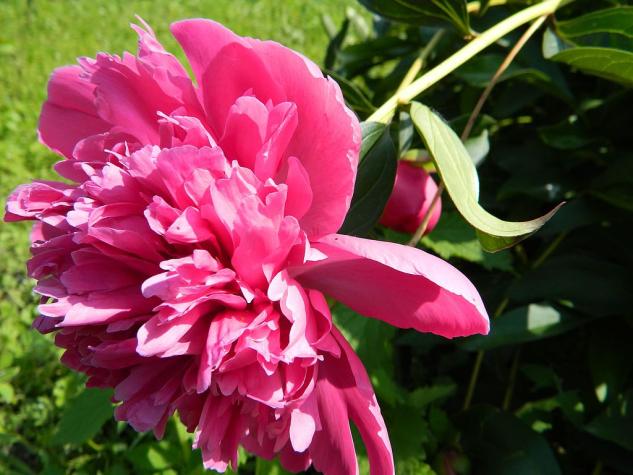

Billowing blooms crown peony the queen of spring
COLUMBIA, Mo. – Few flowers symbolize the arrival of spring more than peonies. Their huge, lavish blooms and distinctive floral scent make them one of America’s most treasured perennials, said University of Missouri Extension horticulturist David Trinklein.
Cool-season pastures start regrowth with arrival of warm-weather rains
COLUMBIA, Mo. – Cool-season grasses such as fescue that dominate pasture grass in Missouri need warm weather to grow.The coldest April since 1907 set back forage for Missouri’s beef cow herds. Now, warm weather with rain creates forage for grazing and haying, said forage specialist Craig Roberts in a weekly University of Missouri Extension teleconference.New grass growth works best if an early crop of seed heads were clipped. That idea…
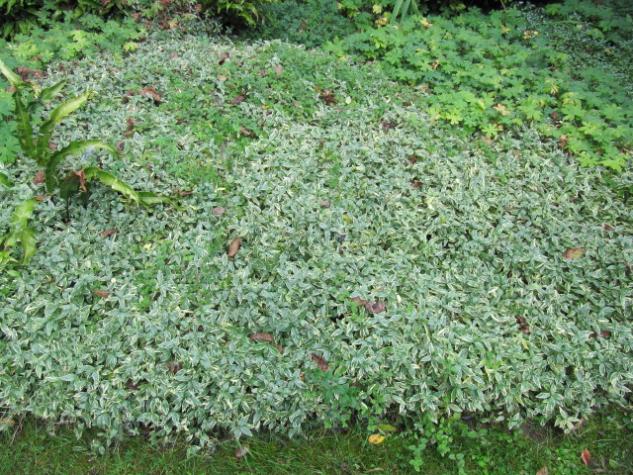
Groundcovers: Shady characters for problem areas
COLUMBIA, Mo. – Many landscapes have problem spots where nothing grows well or looks attractive, such as the area below a large tree with a dense leaf canopy. The area beneath a tree receives relatively little light. This and the competitive root systems of many tree species create a problem for gardeners, said University of Missouri Extension horticulturist David Trinklein
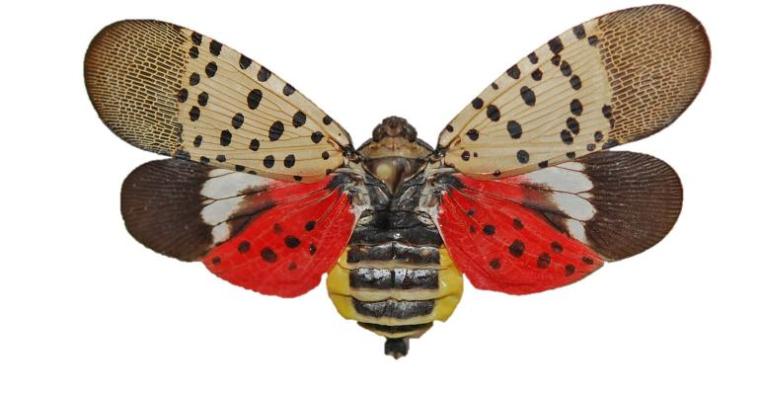
Hitchhiking spotted lanternfly could become problem in Missouri
COLUMBIA, Mo. – An exotic pest that hitchhikes on train cars, trucks and boats could suck the life out Missouri crops. Spotted lanternfly has the potential to establish populations in Missouri, says University of Missouri Extension field crop entomologist Kevin Rice. It damages soybean, corn and hops, as well as fruit and ornamental trees. According to MU Extension viticulturist Dean Volenberg, it could have damaging effects on…
Dairy farmers gain margin protection before new farm bill passes Congress
COLUMBIA, Mo. – A new milk price safety net for dairy producers is in place. To take part farmers must rush to their local USDA farm service center.Milk producers must sign up for the first time or re-enroll by June 1, say University of Missouri Extension dairy economists.Most dairy farmers don’t like the original USDA Margin Protection Program (MPP). That’s a dairy financial safety net in the current farm bill.
Child farm fatalities bring community together to learn about farm safety
FORTUNA, Mo. – The people of the Fortuna and Versailles areas know what a farm tragedy feels like. In the last few years, Mennonite families there lost two children to farm accidents. Another was critically injured.
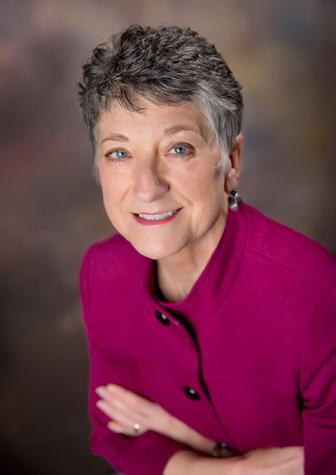
MU's Jo Turner to join National 4-H Hall of Fame
Linda “Jo” Turner, longtime leader in 4-H youth development, will be inducted into the National 4-H Hall of Fame for her impact on statewide programs.
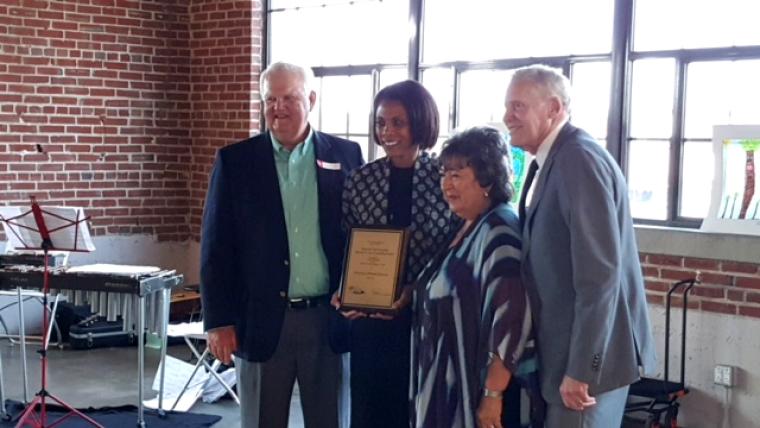
St. Louis Storytelling Festival honors MU Extension
ST. LOUIS – The St. Louis Storytelling Festival awarded MU Extension the inaugural Nancy and Ken Kranzberg Spirit of St. Louis Storytelling Award. Founded in 1980, the festival brings regional and nationally recognized storytellers to St. Louis for workshops, presentations and free storytelling events.
Species spotlight: Persimmon
Persimmon (Diospyros virginiana) goes by many common names; American persimmon, common persimmon, eastern persimmon, simmon, possumwood, and even sugar-plum. It ranges from southern Connecticut/Long Island to Florida, and west to Texas, Louisiana, Oklahoma, Kansas and Iowa.On the local landscape, its range is just as variable; occurring in rocky, dry, open woods; edges of woods, glades, prairies and wetlands, old fields, fencerows,…
Cattle farm tour shows how shade improves profits
ST. JAMES, Mo. – Cattle producers are invited to attend a field day at the Mingo Farm in St. James to learn how to use natural shade to improve their beef operation.The field day begins at 3:30 p.m. Wednesday, June 13, at the Mingo cow-calf operation, 25385 County Road 1000, St. James. University of Missouri Extension, MU Center for Agroforestry and MU College of Agriculture, Food and Natural Resources sponsor the event.
Drought tops questions called to MU Extension
COLUMBIA, Mo. – Extension agronomist talk was calm on the weekly teleconference. Few problems discussed on bugs, weeds, fungus or other pests. Then the weather hit the fan. Reports from across Missouri told of farmers’ concerns about lack of rain.For corn farmers it’s the threat of rootless corn. Soybean growers worry about low emergence and uneven stands.Cattle farmers ask “Where’s the grass? What do we do for hay?”
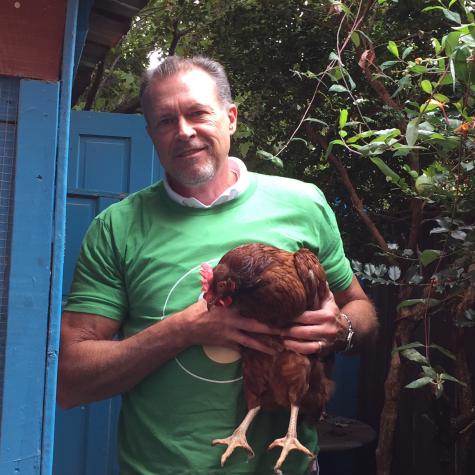
Master Gardener's coffeehouse brings farm to the city
Urban gardener turns a city lot into a thriving coffeehouse garden with chickens, vegetables, and community spirit.
Committee searching for nutrient reduction strategies
COLUMBIA, Mo.– Nutrient loads can cause problems with water quality. That’s why the Missouri Nutrient Reduction Strategy Committee is working to decrease the amount of nutrients that end up in the Mississippi River.The committee, which is made up of 31 organizations and individuals, formed in 2011 when the Environmental Protection Agency made grants to states in the Mississippi River Basin to develop and implement nutrient reduction…
Suicide rate higher in rural areas
COLUMBIA, Mo. – For many, the peace and quiet of country living is the American dream. But that dream can turn to a nightmare for those who become isolated and disconnected from their communities, says University of Missouri Extension safety and health specialist Karen Funkenbusch. May is Mental Health Month. It is a good time to talk with rural family members about increased risks of suicide, says Funkenbusch.
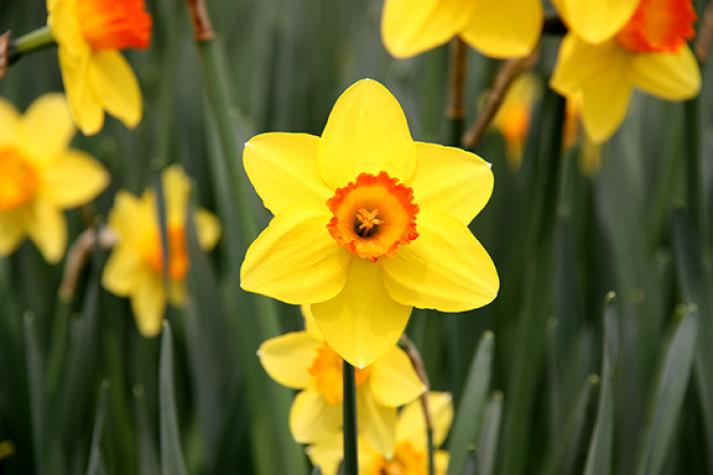
Don't doom next year's bloom
COLUMBIA, Mo. – One of the joys of spring is the emergence and flowering of bulbs such as daffodils, tulips and hyacinths, says University of Missouri Extension horticulturist David Trinklein.
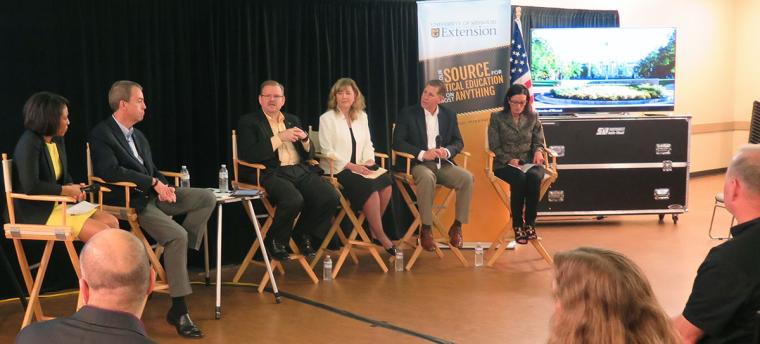
Chancellor announces new vision for MU Extension and Engagement
Inspired by “all things Missouri,” the chancellor unveils a new vision to deepen engagement, expand program reach, and foster community-driven solutions statewide.
Show-Me-Select heifers average $1,787 in second sale of spring at Fruitland, Mo.
Show-Me-Select heifers averaged $1,787 at Fruitland's second spring sale, with top-quality Tier II heifers fetching up to $2,400.
MU Art on the Move exhibition comes to Hannibal
HANNIBAL, Mo. – The artwork of former Palmyra resident and University of Missouri alumna Maddie Olmsted goes on display May 11 at Java Jive, 211 N. Main St., Hannibal.MU School of Visual Studies’ Art on the Move outreach program and MU Extension are co-sponsoring the Hannibal Art on the Move exhibition through June 8. Hours are 7 a.m. to 9 p.m. Monday through Saturday and 8 a.m. to 6 p.m. Sundays, said Lee Ann Woolery, outreach…
MU Extension offers timber workshop
HILLSBORO, Mo. – University of Missouri Extension offers a one-night session in Hillsboro on June 13 to help landowners learn how to market timber.Too many landowners sell their timber for only a fraction of its worth, says MU Extension horticulture specialist Debi Kelly.
MU Thompson Farm advisers see results of 20 years of beef breeding
Twenty years of beef breeding research at Thompson Farm show more uniform, high-quality calves and improved herd genetics.
The power of protein
Everywhere we look we see new, great protein-boosted drinks and foods. But how much protein is really needed, and do Americans get enough or too much?
Be wary of energy drinks
Despite their popularity, energy drinks are not the best option nutritionally, said Tammy Roberts, former University of Missouri Extension nutrition and health education specialist.“Unfortunately, the energy in these drinks comes from sugar and stimulants like caffeine, guarana, ginseng and green tea,” Roberts said.
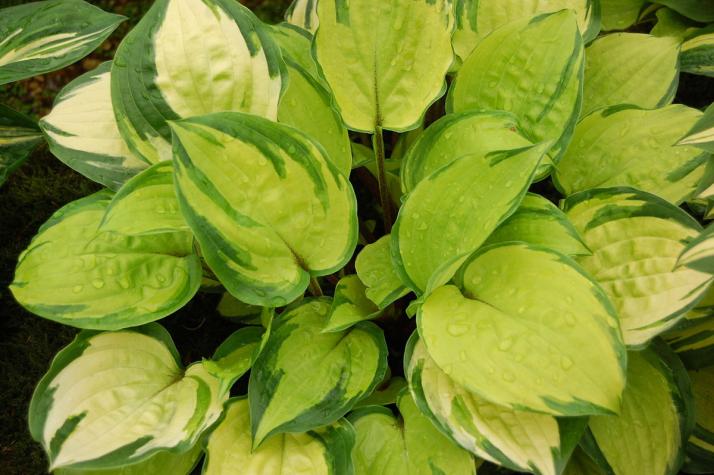
With more than 4,000 cultivars, hostas are emperors of the shade
COLUMBIA, Mo. – A problem many gardeners face is what to plant in a shady area. Perhaps no plant brightens a shade garden more than the hosta, said University of Missouri Extension horticulturist David Trinklein. The hardy perennial thrives in shade and is easy to grow. “It is little wonder why hostas earned the title of ‘emperors of the shade,’” said Trinklein. “Their lush foliage brings attractive color to the shadiest of garden…
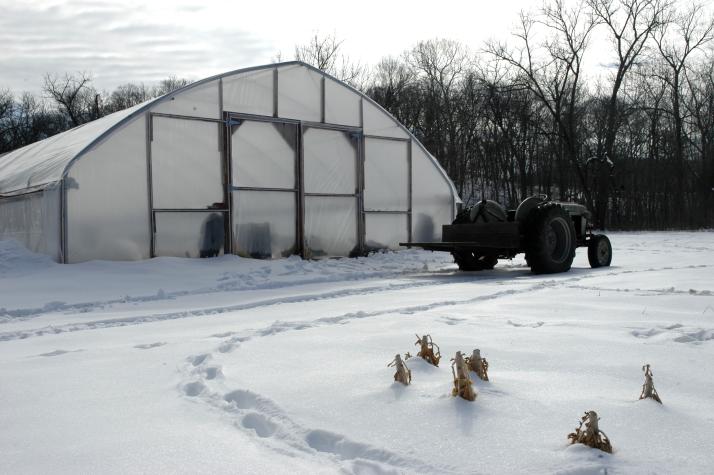
Undercover farming
Discover how high tunnels let farmers grow and harvest fresh vegetables through winter while boosting income and sustainability.
Pills, powders can't replace training and diet for young athletes
Young athletes, eager to be a starting player or earn a scholarship, may be tempted to follow the lead of pros and use performance enhancers to gain a competitive edge.Dale Brigham, University of Missouri nutrition and fitness specialist, said high school and college athletes are better off focusing on their diet and training, rather than relying on performance-enhancing supplements.
